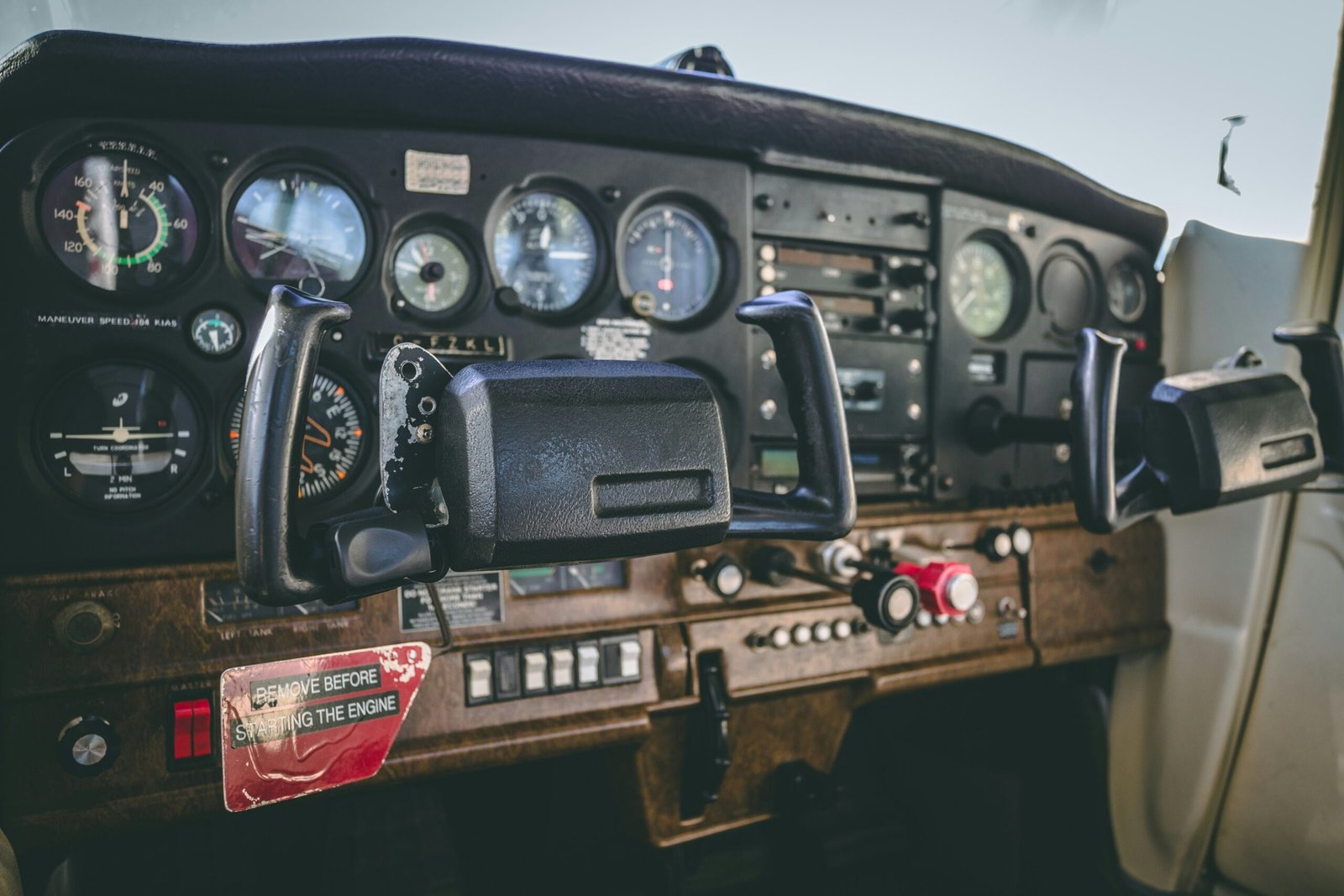aviation training
Navigating the Clouds: The Science Behind Modern Aviation
In today’s rapidly evolving world, aviation is at the forefront of technological innovation, blending science and artistry to create a seamless travel experience. From the moment a pilot steps into a cockpit to the thrilling ascent into the sky, modern aviation is an intricate tapestry woven with precision, training, and cutting-edge technology.
One of the most remarkable advancements in aviation is the use of flight simulators. These sophisticated tools allow aspiring pilots to hone their skills without ever leaving the ground. Simulators replicate real-world flying conditions with astonishing accuracy—from handling turbulence to navigating complex air traffic scenarios. This immersive training not only builds confidence but also ensures that pilots are well-prepared for any situation they might encounter in the air. Institutions like Embry-Riddle Aeronautical University and Purdue University offer comprehensive programs where students can train using state-of-the-art simulators, merging theory with hands-on experience.
For those looking to immerse themselves further into the world of aviation outside formal education settings, numerous blogs and websites serve as invaluable resources. Noteworthy platforms include:
1. **Airliners.net** – A community-driven site where aviation enthusiasts discuss everything from aircraft spotting to airline reviews.
2. **The Points Guy** – A blog focusing on maximizing travel rewards, which often delves into airline news and updates.
3. **AvGeekery** – An online magazine dedicated to all things aviation culture, offering insights from industry professionals.
4. **Flying Magazine** – Provides articles about flying techniques, aircraft equipment reviews, and personal stories from pilots.
Social media has also become an essential medium for connecting aviators around the globe. Platforms like Instagram showcase stunning aerial photography through hashtags such as #aviationlovers or #pilotlife, while Twitter hosts discussions on current events impacting air travel.

Additionally, numerous online courses and ground schools cater to various levels of interest in aviation. Websites like Udemy and Coursera offer tailored programs ranging from basic aerodynamics to advanced navigation techniques—perfect for anyone wanting to dip their toes into this fascinating field or professionals seeking continuing education credits. For those aiming for a pilot career path, obtaining a private pilot license (PPL) usually requires both ground school instruction and actual flight time under supervision.
As technology advances beyond traditional piloting methods, drones have emerged as another exciting frontier in aviation. From recreational use capturing breathtaking aerial footage to commercial applications delivering packages or performing inspections over vast landscapes, drones are revolutionizing various industries. The FAA regulates this burgeoning sector closely; thus understanding FAA guidelines is crucial for anyone interested in operating these unmanned vehicles legally.

To navigate these regulations effectively or explore job opportunities within aviation—be it piloting or drone operation—the FAA provides essential links through its official website [FAA.gov](https://www.faa.gov). Job seekers can find resources including guidance on how to become a commercial pilot or information about careers such as air traffic control.
In conclusion, modern aviation harmonizes technology with rigorous training processes that ensure safety and efficiency in our skies today. Whether you’re an aspiring pilot keen on mastering simulators or simply someone intrigued by drones’ potential impact on our daily lives—there’s no shortage of resources available at your fingertips! Embrace your passion for flight; who knows where it might take you?
The Green Skies Ahead: Sustainable Innovations in Aviation
As we soar into the future, the aviation industry is experiencing a transformative shift towards sustainability. With environmental concerns taking center stage, innovations are reshaping how we perceive and engage with flight. From advanced technology training to the advent of drones, let’s explore how the skies are becoming greener.
In recent years, aviation technology training has evolved dramatically. Flight simulators, once viewed merely as tools for practice, have become sophisticated platforms that incorporate real-world scenarios and challenges. These high-tech simulators allow aspiring pilots to hone their skills while minimizing carbon footprints associated with traditional flight training. By simulating various weather conditions and emergency situations without leaving the ground, trainees can build confidence and competence—essential qualities for those who will be navigating our skies.
For those looking to deepen their understanding of aviation or embark on a new career path, there’s an abundance of online resources available today. Numerous blogs and websites cater to aviation enthusiasts and professionals alike. Some notable mentions include:
1. **AirlineReporter** – Offers insights into airline operations and travel experiences.
2. **The Points Guy** – Focuses on maximizing travel rewards through points systems.
3. **Simple Flying** – Provides news about airlines, aircraft, and developments in aviation technology.
4. **Aero News Network** – Covers a wide array of topics from general aviation to regulatory changes.
5. **Flying Magazine** – A staple for pilots seeking tips on flying techniques and aircraft reviews.
Additionally, social media platforms such as Instagram and Twitter host vibrant communities where aviators share experiences, advice, and updates about the latest innovations in aerospace technology.
For those interested in formal education within this field, online aviation courses offer flexibility that caters to busy schedules or remote learners. Ground schools provide foundational knowledge essential for earning pilot licenses or certifications without requiring physical attendance at a brick-and-mortar institution. Programs often cover everything from navigation principles to aerodynamics—equipping students with the tools needed for successful careers as pilots or other aviation professionals.

Drones represent another exciting frontier contributing to a more sustainable future in aviation. Their ability to perform tasks like aerial surveying, package delivery, and agricultural monitoring reduces reliance on traditional fuel-burning aircraft while minimizing environmental impact. As drone technology continues to advance—both in capability and regulatory acceptance—the potential applications expand exponentially.
Speaking of regulations, familiarizing oneself with FAA guidelines is crucial for anyone involved in aviation—whether they’re aspiring pilots or seasoned professionals seeking compliance information related to new technologies like drones. The FAA offers comprehensive resources online that detail safety protocols and operational standards vital for maintaining airspace integrity while fostering innovation.
As we look ahead at these emerging trends within aviation—from enhanced training methodologies utilizing cutting-edge simulators to the rise of eco-friendly drones—the horizon gleams with promise. The journey toward more sustainable air travel might seem daunting; however, each advancement brings us closer to realizing environmentally conscious solutions that benefit both our planet and future generations of aviators.
In conclusion, embracing sustainable practices isn’t just an option; it’s becoming imperative within the realm of flight operations worldwide. By leveraging technological advancements alongside educational opportunities available today—and staying informed through engaging blogs and resources—we can all play a role in nurturing greener skies ahead!
The Future of Flight: Innovations Transforming Air Travel
The aviation industry is experiencing a renaissance, driven by groundbreaking technology that reshapes how we think about flying. From training the next generation of pilots to the burgeoning world of drones, these innovations promise to redefine air travel for years to come.
### Aviation and Technology Training: Simulators at the Forefront
One of the most significant advancements in pilot training is the use of flight simulators. These sophisticated devices create highly realistic flying environments, allowing budding aviators to hone their skills without ever leaving the ground. Modern simulators replicate various scenarios—from weather challenges to mechanical failures—enabling trainees to respond effectively under stress. This immersive experience not only enhances safety but also builds confidence in new pilots before they take to the open skies.
Additionally, many airlines and flight schools are adopting virtual reality (VR) technologies. VR provides an even more engaging learning experience, making it possible for students to interact with their surroundings in a way that traditional methods cannot match. As these tools evolve, so too will the quality of pilot training programs across the globe.
### A Treasure Trove of Resources: Aviation Blogs and Websites
For those passionate about aviation or seeking knowledge, numerous online resources cater specifically to this field. Here’s a curated list:
1. **Airline Pilot Central** – A great source for airline job listings and industry news.
2. **The Aviation Herald** – Offers insights into aviation safety events and incidents.
3. **Flying Magazine** – Covers everything from aircraft reviews to tips for aspiring pilots.
4. **AOPA (Aircraft Owners and Pilots Association)** – Provides resources for private pilots and enthusiasts alike.
5. **FlightAware** – Track flights in real-time and explore data trends.
Social media platforms have also become valuable tools for networking within the aviation community:
**Instagram** showcases stunning aerial photography and behind-the-scenes glimpses into life as a pilot.
**Twitter** serves as a quick news update hub—follow hashtags like #AvGeek or #PilotLife for instant access to trending topics.
**YouTube** boasts channels dedicated entirely to aviation education, including cockpit tours, tutorials on maneuvering aircraft, and simulator experiences.
### Online Aviation Courses: Ground Schools & Career Opportunities
In our digital age, aspiring pilots can now access an array of online courses tailored specifically for their needs. Many institutions offer comprehensive ground school programs that cover essential topics such as navigation principles, meteorology, and air traffic control regulations—all from your home! Platforms like Coursera and Udemy provide affordable options alongside respected institutions offering accredited courses.
Once equipped with knowledge from these programs, graduates can embark on exciting careers as commercial pilots or flight instructors—roles that promise not just adventure but also competitive salaries and benefits.
### The Drone Revolution: New Frontiers in Aviation
Drones have taken center stage in recent years, revolutionizing both recreational flying and commercial applications. With uses ranging from aerial photography to delivery services, UAVs (Unmanned Aerial Vehicles) are changing how goods are transported globally.
To ensure safe integration into national airspace systems, organizations like the FAA (Federal Aviation Administration) provide essential guidelines regarding drone operation. Their website offers valuable resources—including registration processes and operational restrictions—to help users navigate this new terrain responsibly.


As we look forward into this dynamic landscape of air travel advancements—from innovative training solutions to emerging technologies—the future indeed appears bright for both seasoned aviators and novices alike. The sky is no longer the limit; it’s merely an entry point into boundless possibilities!
Unlocking the Skies: Essential Insights for Aspiring Pilots
Introduction to Aviation
Welcome to Pilot Insights, your premier resource for navigating the world of aviation. Whether you are an aspiring aviator looking to take your first steps into flying or a seasoned pilot seeking to broaden your knowledge, we are here to support you every step of the way.
Essential Knowledge for New Pilots
For those who dream of flying, understanding the basics of aviation is crucial. We offer expert advice catered to aspiring pilots aiming to achieve their aviation goals. This includes tips on flight training, selecting the right flight school, and understanding the fundamentals of flight. Knowledge about aircraft types, regulations, and flight safety measures will enhance your capability and confidence in the skies.
Continuing Education for Experienced Pilots
Even seasoned pilots can benefit from continuous learning, which is vital in this ever-evolving field. At Pilot Insights, we provide resources that delve into advanced piloting techniques, industry updates, and best practices for flying. We believe that through shared experiences and ongoing education, all pilots can attain greater heights in their aviation journey.
From Runways to Skies: The Evolution of Aircraft Technology
The aviation industry has soared to breathtaking heights over the decades, propelled by relentless innovation and technological advancements. From the early days of flimsy biplanes to the sophisticated jets that traverse continents at lightning speed, the evolution of aircraft technology is a testament to human ingenuity. But it’s not just about flying; it’s also about learning and adapting in an ever-changing landscape.
Today, aspiring aviators can take advantage of a plethora of online aviation courses and ground schools designed to equip them with essential knowledge. Whether you’re dreaming of soaring through the clouds as a commercial pilot or exploring other roles like air traffic control, these programs provide invaluable training from the comfort of your home. With organizations offering comprehensive curriculums that cover everything from aerodynamics to navigation techniques, learning has never been more accessible. Platforms like Pilot Institute and Sporty’s Online Flight Academy are leading the charge in digital education for future pilots.
As technology evolves, so do career opportunities within aviation. The demand for skilled pilots continues to climb, alongside various other roles within the sector—such as flight engineers, air traffic controllers, and avionics technicians. According to recent FAA statistics, there’s an ongoing shortage of certified pilots in many regions around the globe. This trend opens up exciting pathways for those considering a career in flying or supporting aviation operations.
Drones have emerged as game-changers in both commercial and recreational sectors. No longer confined to military applications, unmanned aerial vehicles (UAVs) are now utilized for everything from delivering packages to conducting aerial surveys and even filming movies! For those eager to dive into this booming field, obtaining a Remote Pilot Certificate through the FAA is crucial. Resources such as Drone Pilot Ground School provide comprehensive training tailored for prospective drone operators looking to navigate regulations while mastering their craft.

For anyone interested in staying up-to-date with aviation developments or enhancing their knowledge base further, numerous blogs and websites cater specifically to enthusiasts and professionals alike. Some noteworthy mentions include **AirlineReporter**, which covers airline industry news with flair; **Aviation Week**, renowned for its insightful analysis on aerospace trends; and **Flying Magazine**, a rich resource featuring articles about flying techniques and pilot stories.
Social media platforms also play an increasingly vital role in connecting aviators worldwide. Following accounts like @AviationDaily on Twitter or joining Facebook groups focused on aviation discussions allows individuals to engage with experts while gaining insights into trends across different sectors.
Training isn’t limited purely to theory; modern simulators have revolutionized how students practice their skills before hitting real runways. Advanced flight simulators replicate cockpit environments down to intricate details—enabling trainees to experience various scenarios without ever leaving solid ground. Leading companies like Redbird Flight Simulations offer cutting-edge technology that enhances pilot training experiences significantly.
In conclusion, whether you’re contemplating entering the world of aviation or simply curious about its advancements, it’s clear that technology plays an integral role at every stage—from initial education through hands-on simulation experiences right up into the skies themselves! With resources aplenty—from online courses and engaging blogs—to high-tech drones transforming industries beyond imagination—the sky truly isn’t the limit anymore—it’s just the beginning!




